In the last decade, we’ve made significant strides in raising awareness about mental health disorders and issues. Topics such as depression, anxiety, burnout, and neurodiversity have become part of public discourse, and discussing therapy and mental balance techniques is now widely accepted.
We now openly address mental health not only in private but also in the business sphere. A quick glance at LinkedIn shows how taboos around mental health in the workplace are fading. Well-being initiatives and consultations with specialists are becoming standard among work-related benefits.
At the same time, the demand for mental health services is growing and remains unmet. 4% of citizens in EU countries report unmet mental healthcare needs, with Finland, Estonia, and Poland ranking among the highest. This issue is even more pronounced in the United States. This creates an ideal environment for the development of mental health apps, which can bridge the gap and enhance the accessibility of treatments.
The mental health app benefits include providing alternative or supplementary options to traditional therapy, especially during the surge in healthcare app development amid the COVID-19 pandemic.
Types of mental health apps
In recent years, a range of new apps have emerged that support mental health. Some mental health apps are geared specifically towards supporting medical treatment, while others focus on overall wellbeing, helping users maintain healthy habits and reach their personal goals. The scope of the mental health app depends on its provider, too. Sometimes, a mental health application is an independent solution, and in other cases, it supports an existing service.
Wellness apps
Mental wellness apps primarily monitor everyday habits that impact mental health. Elements like diet, exercise, daily routines, vitamin intake, and even water consumption can influence mental well-being. These apps help by tracking various aspects of wellness and providing suggestions to enhance them. Some, like Sleep Cycle, focus on one particular area, while others, like Moodfit, integrate tracking across multiple aspects of life.
A popular wellness app in this category is Calm, which millions use to manage stress and improve sleep quality. This mental health solution features a rich library of meditation sessions tailored for different skill levels. Users can also access Sleep Stories, relaxation music playlists, and breathing exercises to support relaxation and quality rest.
Similarly, Headspace, though also focused on wellbeing, calmness, and sleep, offers unique functions. Both apps feature guided meditations and sleep-promoting content; Headspace includes sleepcasts, specifically designed to encourage restful sleep. Its Move Mode, curated by fitness experts, offers exercise routines aimed at stress reduction.
Therapy apps
Therapy apps are an increasingly popular niche, allowing users to connect with licensed specialists and participate in therapy sessions directly through the platform. A standout success case here is BetterHelp. This app, especially popular in the U.S., provides users with access to licensed mental health professionals. Based on each user’s individual needs and preferences, BetterHelp matches them with a suitable therapist, accounting for expertise and preferred therapeutic approach.
One major advantage BetterHelp offers over traditional therapy is the flexibility of around-the-clock access to therapists, allowing users to reach out whenever they need support. Additionally, the app includes self-help tools that support the therapeutic process between sessions.
Therapy support apps
While many mental health apps are privately developed, some apps work within the public healthcare system to support therapy. A prime example is SilverCloud Health, a platform widely adopted by healthcare providers, including the National Health Service (NHS) in the UK, to supplement traditional therapy with digital support.
Targeted apps for specific mental health concerns
A growing segment of mental health apps target specific challenges. For instance, some focus on addiction recovery, helping users maintain sobriety. An example is I Am Sober, an app that supports users by estimating the financial savings from abstaining from alcohol, building motivation, and connecting users with a supportive community of others in recovery.
Awareness of neurodivergent mental health challenges has also risen, especially among previously underdiagnosed groups, such as women. Digital tools, often overwhelming for the neurodivergent community due to overstimulation, can also effectively support them in managing daily challenges. Because neurodivergent minds function differently, apps tailored to neurotypical well-being may not be effective. These tools, from interface to features, require a specific approach.
Apps like Inflow and Routinery cater to neurodivergent users by offering daily focus tools, cognitive skills training and tracking features. These tools empower users to understand their own behaviours and establish routines that best support their unique needs, making day-to-day tasks more manageable.
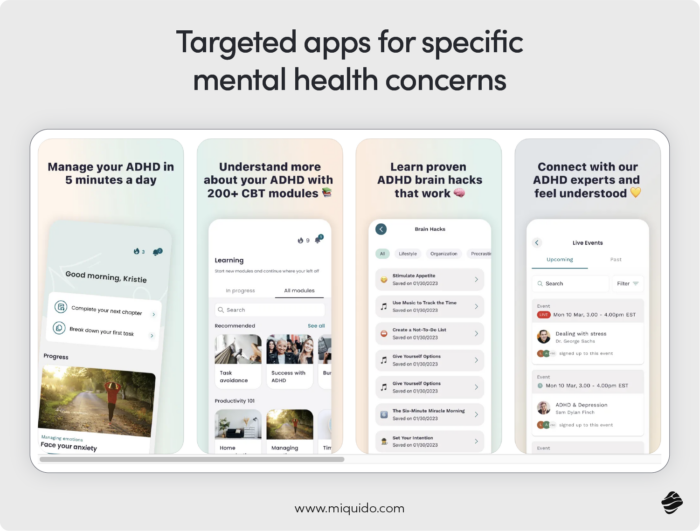
Benefits of mental health app development for healthcare institutions and providers
Mental health app development offers numerous benefits for both users and healthcare providers. By leveraging technology, mental health apps can provide accessible, convenient, and cost-effective solutions for mental health issues.
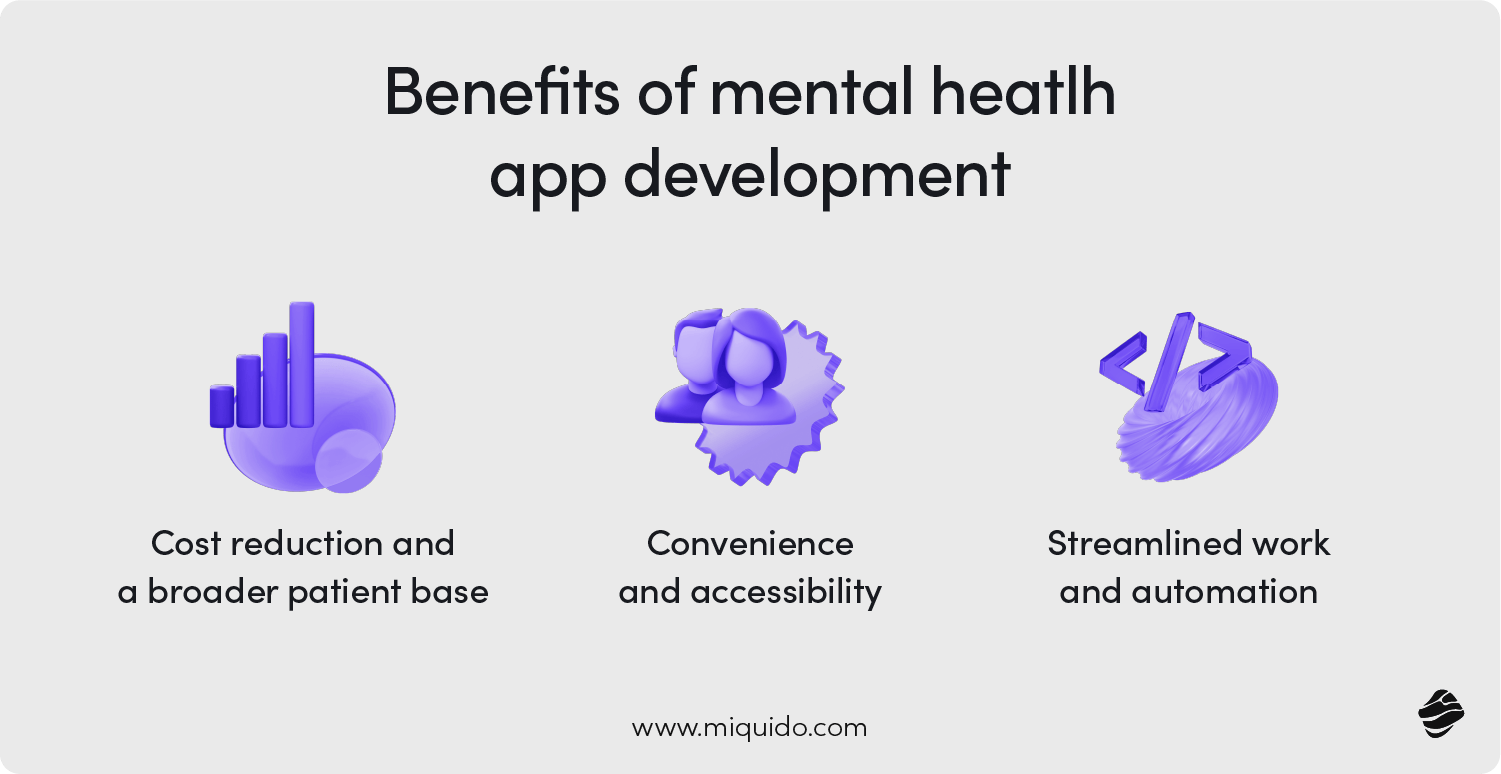
Convenience and accessibility
One of the standout benefits of mental health apps is the unparalleled convenience they offer. Users can access mental health services from the comfort of their homes at any time that suits them. This is particularly beneficial for individuals living in remote areas or those with mobility issues who might otherwise struggle to access traditional mental health services. With mental health apps, users can schedule therapy sessions, track their moods, and receive personalized recommendations without needing physical visits to a healthcare provider. This level of accessibility ensures that more people can get the help they need when needed.
Cost reduction and a broader patient base
Mental health apps also play a crucial role in reducing the costs associated with traditional mental health treatment. By offering online therapy sessions and self-monitoring tools, these apps can significantly reduce the need for in-person visits and hospitalizations. This not only makes mental health treatment more affordable for users but also helps healthcare systems manage resources more efficiently.
Additionally, mental health apps can reach a broader patient base, including individuals who may not have access to traditional mental health services due to financial constraints or geographical limitations. This democratization of mental health care ensures that more people can benefit from professional support.
Streamlined work and automation
Mental health apps can streamline various aspects of healthcare providers' work through automation. Tasks such as data collection, analysis, and patient monitoring can be automated, freeing up valuable time for providers to focus on delivering high-quality care. Mental health apps can also provide healthcare providers with valuable insights into patient behavior and treatment outcomes, enabling them to make data-driven decisions. This not only enhances the efficiency of mental health services but also improves the overall quality of care provided to patients.
Mental health app features that grant opportunities
Mental health apps can potentially empower users by providing them with opportunities for growth, connection, and understanding of their own mental well-being. By integrating thoughtful features, these apps can become valuable tools for improving mental health.
Virtual assistants
The integration of virtual assistants is increasingly common in various applications, from banking to e-commerce, and plays a crucial role in mental health apps. In these applications, virtual assistants can support a patient's progress and answer questions 24/7. For many users, chatbots or virtual assistants are a key mental health app feature and are often the main value of such applications.
Feedback mechanisms are essential for these virtual assistants. They allow the assistant to gather and build knowledge about the user and what best supports their mental health journey. When using open language models, mental health app developers must implement Retrieval-Augmented Generation (RAG) systems to minimize hallucinations. RAG techniques let the model base its responses on an external, authoritative knowledge base, reducing potential bias and misinformation. Adjusting parameters like temperature also helps ensure responses are accurate and reliable.
Booking appointments
Therapy applications typically include a booking module that syncs with the calendars of professionals. Booking a session through the app is an important feature for most users, as it allows them to schedule their first visit and future appointments in seconds, which can be especially helpful for people with mental health issues like phobias or anxiety. The ease of booking can lower the barriers to accessing help.
When implementing this feature, it’s important to remember that therapists may also take bookings through other channels. The mental health app should support integration with therapists’ calendars to avoid double booking. This integration ensures that any appointments booked through the health app will immediately appear in the therapist’s schedule and be automatically removed if canceled.
Additionally, a well-designed calendar feature protects both parties financially. In traditional systems, cancellations can cause issues, but in a mental health app, refunds can process automatically based on set rules. Patients can also add funds to their accounts over time, avoiding the need for individual payments for each session.
Virtual calls
A crucial feature in mental health applications is the online meeting module, allowing therapy sessions to happen entirely within the platform. This feature not only makes it easier to track the therapy process but also provides greater transparency for users. For therapists, the platform safeguards their reputation, as reviews come only from clients who have genuinely undergone therapy with them. Often, it comes with an option of a call or live chat as an alternative, like in the case of BetterHelp.
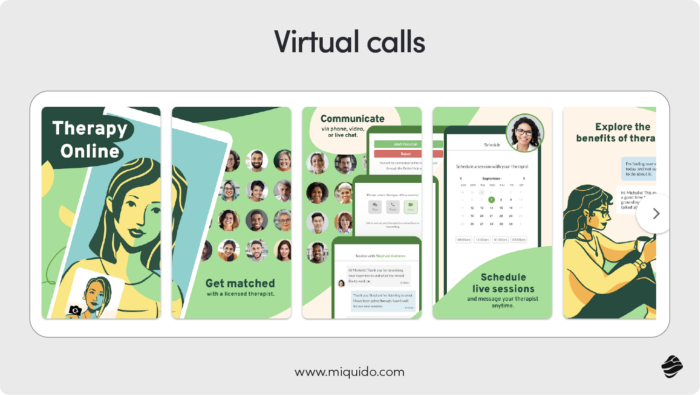
Virtual calls are also commonly included in mental health apps for healthcare facilities, supporting patients with limited mobility or those experiencing a crisis who need remote assistance.
Treatment plans
For general mental health apps focused on wellness, personalized plans around exercises, diet, and meditation activities form the core of their offerings. Typically based on an initial questionnaire, these plans highlight the user's concerns and goals and are adjusted over time based on tracking data.
One of Miquido's bespoke software development services projects, Uzume, though not specifically designed for handling mental disorders, showcases an intuitive planning feature that could support wellness goals. Ranked among the top self improvement apps, Uzume is primarily a task management tool with versatile applications—whether for weight loss, career advancement, or general well-being.
What makes Uzume unique is the agency it gives its target audience. Rather than prescribing a single path to achieving goals, Uzume offers multiple routes, allowing users to choose their preferred approach. And since sometimes it’s about the journey, not the destination, users can also opt for a goalless path if they wish.
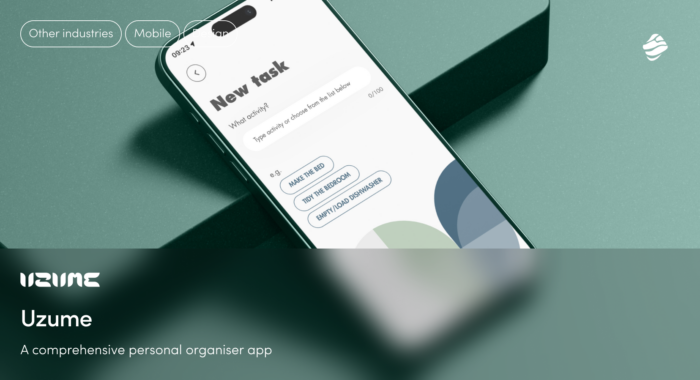
Personalized treatment plans are also essential in apps focused on pharmaceutical treatment. These plans are created around prescribed medications and doctor recommendations, including calendars and checklists that help patients adhere to their therapy while providing doctors with insightful feedback.
Instructional videos
Aside from recommendations and voice-guided exercises like Calm and similar mental health mobile apps, some also include instructional videos. It is an essential element in the case of solutions that involve physical exercises in their plans.
That was the case with the mental health solution for the patients with neuromuscular disorders created by Miquido. Physio provides curated daily sets of exercises that aim to prevent further muscular degradation. Aside from the patients themselves, it also supports the caregivers, granting them access to specialized knowledge and enabling them to proactively participate in the healing journey.
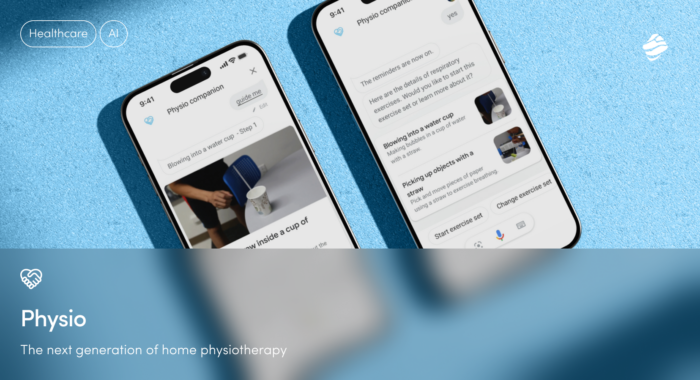
Recommendation engines in mental health and well-being apps
A common barrier that holds patients back from seeking help is a lack of knowledge. Many people don’t know which therapeutic approach is right for them, and professional terminology can feel intimidating. Here, apps play a critical role by breaking the ice and easing the first steps into therapy. Different methods exist for collecting the data needed to recommend specialists, but to achieve accurate results, it’s essential to include the following modules:
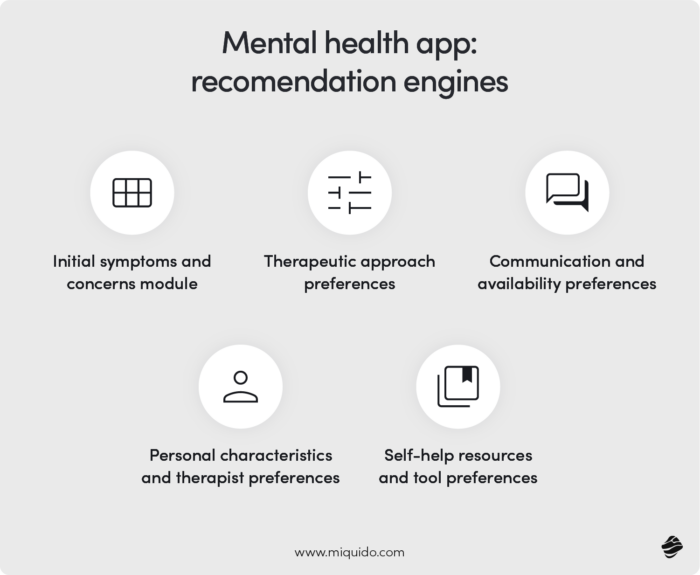
- Initial symptoms and concerns module This module allows users to select specific issues they’d like to address, such as anxiety, depression, stress management, relationship challenges, or trauma. Tailoring therapy recommendations to these specific areas can significantly increase the relevance of the suggested specialists.
- Therapeutic approach preferences While it’s helpful to ask users if they have a preferred therapeutic approach (e.g., cognitive-behavioral therapy, mindfulness-based therapy), it’s also essential to remember that many users are new to therapy. This module can include brief descriptions of different therapy types to help users make an informed choice or choose “I’m not sure,” allowing flexibility in their matching process.
- Communication and availability preferences This module collects information on users' preferred formats for therapy, such as text, audio, or video sessions, and their scheduling needs. Offering flexibility ensures that therapy fits seamlessly into their routines and meets their comfort levels, which can boost engagement and effectiveness.
- Personal characteristics and therapist preferences Users often benefit from working with therapists who share or understand their cultural background, values, or preferences related to therapist gender or age. This module can ask questions to determine if users have any specific therapist preferences.
- Self-help resources and tool preferences Including a module that inquires about interest in self-guided tools, such as mood tracking, journaling, and guided exercises, can add value to therapy and support users’ growth between sessions.
A preliminary questionnaire may or may not need to include therapy type preferences, keeping in mind that many users are just beginning their journey. To guide users to the right therapeutic approach without directly asking them to choose, the questionnaire can include experience-based questions and scenarios that naturally align with different therapy styles. This approach allows users to answer based on their needs and experiences, and the app can infer their ideal therapy approach based on their responses. Here’s how this can be structured:
Ask about coping styles and preferences
- Example question: “When facing a difficult situation, do you prefer structured steps to solve it, space to explore your feelings, or a mix of both?”
- Purpose: People who prefer structure may align well with cognitive behaviour therapy (CBT), which is highly structured and goal-oriented. Those who prefer space to explore might lean toward psychodynamic therapy, which focuses on self-reflection and uncovering underlying thoughts.
Assess interest in mindfulness and body awareness
- Example question: “Would you be interested in using techniques like mindfulness or relaxation exercises as part of your therapy?”
- Purpose: This can identify users who may benefit from mindfulness-based approaches, which include mindfulness-based cognitive therapy (MBCT) or acceptance and commitment therapy (ACT).
Explore relationship and communication needs
- Example Question: “Would you like support in understanding and improving relationships with others, or would you prefer focusing mainly on personal thoughts and feelings?”
- Purpose: This question helps determine if someone might benefit from interpersonal or relationship-focused therapies (like interpersonal therapy or family systems therapy) versus individual-focused therapies.
Gauge interest in self-guided exercises and assignments
- Example Question: “Would you find it helpful to complete exercises or activities outside of therapy sessions to help manage your thoughts and behaviours?”
- Purpose: This question helps identify people who might prefer CBT or solution-focused therapy, both of which often include “homework” exercises that reinforce skills learned in sessions.
Patient monitoring
Some of the mental health solutions target mental health specialists rather than private users. Rather than relying on patient's visit reports, they can gather information in real-time and intervene accordingly. For example, the aforementioned SilverCloud Health includes a feature that lets mental health professionals under NHS monitor patient progress remotely and offer guidance when necessary, bridging the gap between in-person therapy sessions and providing ongoing support.
Designing a mental health app
Designing a mental health app requires a user-centred approach that prioritizes the needs and preferences of the target audience.
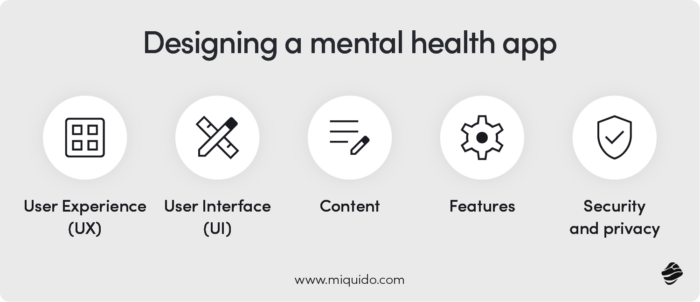
When developing a mental health app, consider the following key areas to ensure success:
- User Experience (UX): Prioritize simplicity. Ensure users can quickly find what they need without confusion. Use real-world testing to identify friction points, and eliminate anything that could lead to frustration. An intuitive onboarding process can make all the difference in encouraging users to return.
- User Interface (UI): Make the design clean and visually inviting. Use calming color schemes, simple layouts, and ensure that buttons and icons are clearly labeled. Consider accessibility—include options like adjustable text size and voiceover capabilities so all users, regardless of ability, can benefit.
- Content: Create content that directly addresses the pain points of your target audience. Ensure all advice, resources, and activities are research-backed and presented in an empathetic, relatable tone. Mix formats—text, video, and interactive exercises—to keep users engaged and cater to different learning styles.
- Features: Incorporate features that genuinely serve your audience's needs. This could include mood tracking, guided meditation, progress reports, or a journaling function. Use surveys or beta testers to validate which features are most wanted and make them straightforward to use.
- Security and privacy: Build user trust by prioritizing data security from day one. Use end-to-end encryption for sensitive data and be transparent about your privacy policies. Consider incorporating two-factor authentication to add an extra layer of protection. Always comply with relevant health data regulations (such as HIPAA or GDPR).
By staying focused on these specific actions, you can create a mental health app that is not only effective but also truly user-centred. Understanding your target audience’s needs, designing with empathy, and implementing strong security measures will ensure the app delivers real value and keeps users coming back.
Mental health app development
The development of mental health apps has opened up new opportunities for individuals seeking mental health support. These apps offer features such as mood tracking, meditation guides, and virtual therapy sessions, which can be accessed conveniently from a smartphone. With the rise in mental health awareness and the surge in healthcare app development during the COVID-19 pandemic, the benefits of using these applications as alternatives or supplements to traditional therapy have become increasingly evident. These features contribute to the overall mental health app benefits, such as improved accessibility and personalized care.
Gen AI features in mental health apps
With the boom in GenAI, many people have discovered an unexpected use for intelligent chatbots: therapy support. The generative capabilities of such models make it possible to create a virtual therapist from scratch, one that can guide conversations in alignment with a chosen therapeutic approach. By increasingly understanding the person they’re engaging with, these chatbots can help users find constructive solutions.
With it, come a few challenges. First, biases are a relevant concern, especially since they have previously been found in algorithms used by the U.S. health system. Generative AI learns from human data and inevitably absorbs our biases as well. Does this mean that human therapists are immune to them? Not exactly; however, they possess tools that help filter out such biases.
Second, model hallucinations can lead to unfortunate scenarios where the virtual assistant offers unsafe advice or triggers the user by crossing personal boundaries without psychological expertise.
AI as therapy support, not a substitute
All these factors indicate that Generative AI, by itself, is not an alternative to therapy. However, it can provide excellent support. According to Scott Wallace, a clinical psychologist at Remble, “The prevalence of mental health issues in America is reaching a critical point.” Given this situation, it’s hard to ignore the potential of generative AI in mental health. Users will naturally turn to this form of support—so instead, it’s worthwhile to focus on education and providing tools that help mitigate the risks of using open language models directly.
Personalized gen AI content in mental health apps
A common feature of mental health challenges is tunnel vision and thought patterns that trap individuals in negative thinking cycles. This can significantly hinder and delay progress in recovery. The support of therapists and other medical professionals is crucial for working through these patterns. However, they can’t be in constant contact with patients 24/7.
An app, on the other hand, can serve as a constant companion, actively supporting the patient in tackling these thought patterns. By continuously collecting data on user behavior, it can generate notifications and supportive content aimed at improving mental well-being and advancing treatment goals. Interactive elements within the app help gather feedback and refine responses while gathering more information about the patient’s mental state and symptoms.
Take the example of Woebot, an AI-driven mental health app that uses cognitive-behavioural techniques to guide users through thought-restructuring exercises. When the app detects recurring negative patterns, it might prompt the user with questions to challenge those thoughts or suggest mindfulness exercises. This real-time intervention can help users recognize unhelpful thought loops and start to shift their perspectives, making it a valuable tool for maintaining progress between therapy sessions.
The future is bright for mental health app development
Mental health treatment has become increasingly popular in recent years with the decreasing number of healthcare professionals available and rising awareness of mental health. The public system is already overcharged and this trend will only aggravate in the following years. At the same time, the struggle to afford private mental health services is real.
The healthcare mobile app trends already reflect these issues, with many initiatives focusing on accessible therapy services. Mobile apps could help bridge this gap and increase access to treatment in underserved areas. The Miquido AI Kickstarter Deck offers a promising resource to accelerate AI development, particularly for mental health innovators. This framework speeds up development by three times compared to starting from scratch, providing specialized tools for data management, summarization, and task automation. By leveraging GenAI through this Kickstarter, healthcare institutions with groundbreaking ideas can bring their accessible mental health solutions to market quickly and effectively.








![[header] is flutter good for mobile app development](https://www.miquido.com/wp-content/uploads/2025/12/header-is-flutter-good-for-mobile-app-development_-432x288.jpg)
![[header] how to reduce churn on a form validation stage (1)](https://www.miquido.com/wp-content/uploads/2025/12/header-how-to-reduce-churn-on-a-form-validation-stage_-1-432x288.jpg)